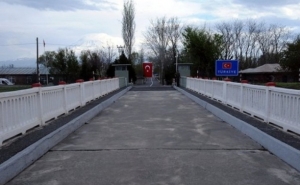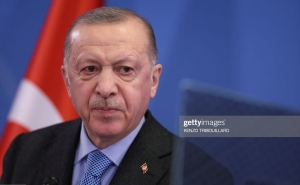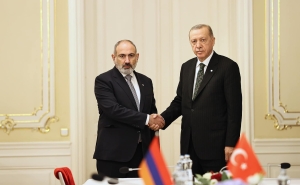 Yemen Crisis Sparks Ottoman Nostalgia in Turkey
Yemen Crisis Sparks Ottoman Nostalgia in Turkey

"Recep Pasha, intervening in the interior affairs of the countries of the region, has participated in the massacre of 130,000 innocent people’s in Syria. Erdogan thinks he can take a place among the other sultans as a winning sultan, yet Recep Pasha must give up Neo-Ottomanism ideology and apologize to the great nations of the region," - Deputy President of the commission for Security and Foreign Policy Affairs of Islamic Republic in Majlis of Iran Islamic Republic reacted in such way to the recent statement made by the Turkish President Recep Tayyip Erdogan on Yemen given to France 24 in which he particularly stated:
"No doubt, Iran wants to take control over the whole region. This is certainly not a positive development. We have discussed Syria and Iraq with them [the Iranians]; still, we have not noted a positive move yet. As for the Islamic State, Iran’s actions are not sincere in that matter. Iran tries to take control over the territories which are under ISIS’s possession and take actions at the background of Shia-Sunni split."
In his turn Iran Foreign Minister Mohammad Javad Zarif noted on the occasion: "It would be better if those who have created irreparable damages with their strategic mistakes and lofty politics would adopt responsible policies."
What does stand behind this new diplomatic crisis between Turkey and Iran? What does Turkey aspire by presenting itself with the sharpest stance against Iran in the context of Yemen crisis?
To answer these questions the wording used by the Iranian officials "Neo-Ottomanism" should be elaborated, which can explain the Turkish long-term political and hegemonic ambition in the Middle East. The long-carried hopes of the Turkish president to see Turkey as a regional leader made him take every tool, along with religious radicalism and terror to fulfill its goal. The declaration of the current Prime Minister of Turkey Ahmet Davutoğlu made in 2012 in which he particularly stated "Whatever we lost between 1911 and 1923, whatever lands we withdrew from, we shall once again meet our brothers in those lands between 2011 to 2023," presents a vivid interpretation of Turkish neo-ottoman policy.
In this context the actions undertaken by the Turkish government since the spread of the recent wave of terrorism in the region with the rise of Islamic State terrorist organization and often heard accusation against Turkey of its involvement with "black army", according to which Turkey supports terrorist radical organizations in the region to fulfill its long-term held goals of territorial expansion is not by chance.
But why does the crisis in Yemen become a kind of new momentum for the Turkish new expression of "Ottoman nostalgia"? No matter how simplistic the answer may sound at first glance, however, recent developments in the region seem to restore the memory of some conservatives and nationalist in Turkey according to which Yemen historically belonged to the Ottoman Empire; the fact which is vividly expressed by the Turkish media’s psychological war, as it is rightly stated by Fehim Taştekin in his article entitled "Turkey Impulse". In practical reality the "nostalgia" of the past is expressed by "the current war of words" by Turkish authorities, by which Turkish authorities strive to regain their lost authority in the Sunni bloc in the region.
The interesting thing to notice is the tool used by the Turkish authorities to struggle against Iran and to regain the trust of Sunnis in the region. Here again, if one pays attention to the wording used by the Turkish President in his accusations against Iran, it will become obvious that the Turkish authorizes, loyal to their strategy, cling to the same tools used against them by other countries. The Turkish authority blames the Iranians for "trying to take control over the territories which are under ISIS’s possession and take actions at the background of Shiite-Sunni split"; the accusation which was made against Turkey by many countries, even by the US, Turkey’s NATO ally. In this sense the similarity of the wording used by US Vice President Biden at the John F. Kennedy School of Government at Harvard University is not by chance. In particular Joe Biden stated:
"Our allies in the region were our largest problem in Syria. They (Turkey, Saudi Arabia and the UAE) were so determined to take down Assad, that in a sense started a "proxy Sunni-Shiite war" by pouring "hundreds of millions of dollars and tens, thousands of tons of weapons into anyone, who would fight against Assad."
Thus to sum up all the above-mentioned, we can state that Ottoman nostalgia of Turkish authorities, no matter how naïve it may sound, comes to explain the Turkish present-day stance in Yemen. Turkey strives to achieve its long term desired hegemony in the region by allying to the Sunni camp blaming the others, such as Iran, not to be blamed itself. For the picture to be complete it just should be mentioned that such kind of ambitions from Turkey along with Turkish nostalgia of past are also based on rational calculation of benefits Turkey can derive after allying with Sunnis in the region such as money of Gulf countries, hope to restore its strained relations with the US etc. - factors each of which demands further elaboration.
Other materials on this subject
- 2 dead, 2 injured after fire at lodging section of Armenian Catholic Church in Istanbul He said the firefighter-rescue team arrived immediately. Armenian Catholic Archeparch of Istanbul Archbishop Lévon Zékiyan was also on the scene.
- Turkey is sending Cold War-era cluster bombs to Ukraine – FP The weapons are designed to destroy tanks by bursting into smaller submunitions, which can linger on the battlefield for years if they do not immediately explode. Each round scatters about 88 bomblets.
- Fire erupts in Turkey’s Black Sea port of Samsun following explosion The causes for the explosion that led to a fire are currently being analyzed.
- EU Urges Turkey to Stop Offering Russia Solutions to Circumvent Sanctions Speaking about the EU's engagement with Turkey, an important neighbor, EU partner and candidate country for EU membership, we stress the importance of ensuring that Turkey's foreign policy is aligned with...
- Any Change of Internationally Recognized Borders in Region is Unacceptable – Iranian President to Erdogan "The basis of our policy in the region is that the fates of the countries must be determined by themselves and that their national sovereignty and territorial integrity must be respected" Raisi told Erdogan...
Other materials on this subject
- Yemen's Houthis Say Launch Drone Attack at Saudi Border Airport The attack was in response to "the continued escalation by the forces of aggression and their siege of the great Yemeni people," Yahya Saree, a military spokesman for Yemen's Houthi militia said in a tweet.
- Saudi-Led Coalition Declares 2-Week Coronavirus Ceasefire in Yemen: Al-Jazeera There was no immediate comment by the Houthis.
- Arab Coalition Launches Military Operation North of Hodeidah in Yemen Colonel Turki al-Maliki, spokesman for the Arab coalition, said the coalition forces foiled “an imminent terrorist act by the Houthi militia south of the Red Sea.”
- Yemen Govt Accuses UAE of Launching Air Strikes against Troops The deputy foreign minister did not say when the alleged air strikes took place.
- Yemen: Dozens Killed in Houthi Attack on Aden Military Parade The Houthis' official al-Masirah TV said the group launched a medium-range ballistic missile and armed drone at the parade, which it described as being staged in preparation for a military move against...
-
 17:08
17:08The regular session of the Anti-corruption Policy Council takes place in Jermuk
-
 15:05
15:05The Prime Minister sends congratulatory messages to the supreme leader of Iran and the President of Iran
-
 11:11
11:11Armenia sends earthquake aid to Turkey
-
 10:43
10:43Commemoration of the Pontiff St. Sahak Partev
-
 09:16
09:16Some roads are closed and difficult to pass in Armenia
-
 19:55
19:55Phone conversation of the Foreign Minister of Armenia with the U.S. Assistant Secretary of State for European and Eurasian Affairs
-
 18:30
18:30Prime Minister Pashinyan and President Khachaturyan meet
-
 18:20
18:20Ararat Mirzoyan with Co-Chairman of the OSCE Minsk Group of France Brice Roquefeuil
-
 17:01
17:01Humans could land on Mars within 10 years, Musk predicts
-
 16:45
16:45France, US urge 'immediate' end to Nagorno Karabakh blockade
-
 16:01
16:01Blockaded Nagorno Karabakh launches fundraiser to support quake-hit Syria
-
 15:59
15:59Earthquake death toll in Turkey rises to 18,342
-
 15:43
15:43Ararat Mirzoyan Held a Telephone Conversation with Sergey Lavrov
-
 15:06
15:06French president rules out fighter jet supplies to Ukraine in near future
-
 14:47
14:475 Day Weather Forecast in Armenia
-
 14:44
14:44President Vahagn Khachaturyan wrote a note in the book of condolences opened in the Embassy of Syria in Armenia
-
 14:20
14:20Azerbaijan’s provocations impede establishment of peace and stability – Armenian FM tells Russian Co-Chair of OSCE MG
-
 12:57
12:57France representation to OSCE: Paris calls on Azerbaijan to restore freedom of movement through Lachin corridor
-
 11:40
11:40Command of Kosovo forces highly appreciated preparation of Armenian peacekeepers
-
 10:16
10:16The United States withdrew from sanctions against Syria for six months the provision of assistance after the earthquake
day
week
month
Humidity: %
Wind: km/h









